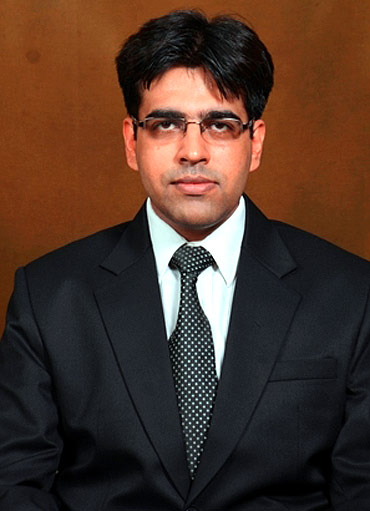 | « Back to article | Print this article |
CAT topper: Focus on your strengths and let it reflect in your scores
26 year old Sumar Loomba from Ghaziabad, Uttar Pradesh who scored 99.91 percent in CAT 2010 shares his success mantra and offers tips to crack the exam.
Sumar Loomba did not attend a coaching class. He scored an aggregate of 99.91 percent in CAT 2010 and sought admission in NITIE, Mumbai.
The 26 year old from Ghaziabad, Uttar Pradesh started preparing for CAT 2010 only four months before the exam and dedicated about 6-8 hours of study each day.
He says that determination and focus is all that one needs to crack the CAT. A computer engineering graduate from Jamia Milia Islamia, New Delhi, Sumar is currently pursuing Post Graduate Diploma In Management at NITIE, Mumbai.
He shares with Divya Nair the golden SPICE rule of vocabulary among other useful strategies he used to crack the exam last year. Along the way he also busts some CAT myths.
How much did you score in CAT 2010?
I scored 99.99 percent in English, 99.98 in Data Interpretation, 98.3 in Quant, and my aggregate was 99.91 percent.
When did you start preparing for CAT? What was your initial strategy?
I started four months in advance and I would dedicate approximately two hours for each subject. Since there are four sections, I would spend about 6-8 hours a day on preparation. I was also working with Tata Consultancy Services, so this was the maximum time I could dedicate in a day.
I did not attend any coaching class. Instead I had enrolled with a few test series providers who would provide me with mock test papers and solutions.
What is the most common myth about CAT?
Well, most students think that vocabulary is not very important. Some of them told me that direct vocabulary questions do not appear in CAT. But that is not true. If you are strong with your vocabulary, you will find it easier to crack sentence correction and other problems in the verbal ability section.
At the same time, I realised that CAT focuses on application based questions and if you observe the trend of questions they are not extremely difficult to crack.
What do you think was your winning strategy?
If you know your basics, you need not worry at all. A lot of people succumb to cramming and therefore underperform in the final exam.
The key is to start with the section you are most comfortable with and optimise your time accordingly. You can always come back and solve difficult questions later when you have the time. Always focus on your strengths and let it reflect in your scores.
'Try the SPICE rule for vocabulary'
Kindly share some section wise tips and strategies to crack the exam with our readers.
Reading Comprehension
According to me, this is the most important section of CAT. It accounts for about 60 to 70 percent of your overall score.
While you are revising, brush up your reading comprehension and vocabulary skills. Read as many passages as you can while you are preparing to develop your speed of reading and improve your grasping ability.
While you are at the examination hall, ideally start with RC section. I am saying this because it will require time to read passages. Another trick that I learnt was to read the questions first before the passage. This helps because the questions will give you a gist of what is expected of you and help you focus better, since time is crucial.
On second thoughts, I would suggest that aspirants must read the first and last paragraphs of the passage. The body of passage is usually full of examples and situations that may not always be useful.
Verbal Ability
While you are preparing for VA, try the S.P.I.C.E. rule for vocabulary. It so happened that while I was studying, I came across this research that pointed out knowing words beginning with alphabets S, P, I, C and E greatly help during entrance exams. With time, I realised that the findings of the research was greatly true.
Similarly, learn as many new words as you can. To narrate a more personal example, I could answer one of the questions in sentence correction only because I knew the meaning of that one particular word. So if your vocabulary is good, chances are you will have an edge while solving this section.
Quantitative Analysis
Majority of QA problems focus on Geometry. Focus on problems of time-speed-distance, and number system. Engineers will find it easy to crack this section.
Logical Reasoning
While solving them, it is advisable to draw diagrams. This will help you understand and interpret the data better.
Data Interpretation
Initially, these problems may take a godly amount of time. Primarily, because there's a huge amount of data to be comprehended. However, cracking this section improves with practice. But be careful not to spend more than 10 minutes of your time on a single question.
'Focus on improving your strengths rather than working on your weakness'
First of all, do not spend all your time solving test papers alone.
After you are done solving a set, get your score card and find out the sections you have scored poorly. Now, analyse your scores with your past performance and find out if you are repeating the same mistakes.
When you are approaching the date of exam, focus on improving your strengths rather than working on your weakness and worrying about it.
In your opinion what is a decent score to qualify for the leading b-schools?
I think if you score an aggregate of 98.5 percent and above, you will stand a good chance to make it to any good b-school, including the IIMs.
However, institutes also take into account your past academic performances -- high school and graduation scores. Your performance in the Group Discussion and Personal Interview rounds also adds value.
Would you like to share any last minute tips to aspirants?
Since there's only a week left, do not follow strategies. Do not waste your time learning new formulae and concepts. Instead, focus on revision and try to solve at least one problem from each section and chapter daily. Revise your formulae well.
How easy or difficult is it to crack the CAT?
If you ask me, I would say, it is not as difficult as it seems to be. If you are determined and willing to work hard, any one can crack it.
How can students optimise their chances of admission during the GD and PI rounds?
During the Group Discussion round, you should remain calm and confident. The invigilator doesn't expect you to have an opinion or answer on everything being asked or discussed, but your attempt to participate will be considered in your favour.
In the interview round, if you don't know the answer to a particular question, be honest to admit your ignorance. Be passionate towards your goals and elucidate your achievements and work experience.
What factors should one bear in mind while applying to and choosing a b-school?
This is by far the most crucial decision making stage. What happens with most students is that they have the best scores but end up choosing the wrong school. By wrong, I mean, that the school is not the best for his/her area of specialisation or interest.
Let me give you an example. If a student wishes to study supply chain management, NITIE, Mumbai is the best place to enrol. But if you want to study finance and you had to choose between IIM-Indore and MDI-Gurgaon, the former would be the ideal choice.
In order to make such informed decisions, you will have to spend some time in research. This involves checking the college website, news reports related to the institute, talking to senior batch mates, professionals.
One of the most common mistakes that 90 percent of students make is that they rely on feedback given by their senior batch mates.
The reason why this doesn't work is because seniors from a particular college tend to be biased towards their college, so their view is largely subjective. Instead try asking professors, who will give you a better feedback.
From what I have observed, students will rate college performance in terms of placements offered, while professors will emphasise on academic competence. You can weigh both factors and arrive at a better conclusion.
Remember that a good pay package is a short term investment. If you have the right education, it will stay with you for life. I know a lot of my peers won't agree with me, but that's how I see it.


